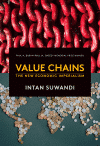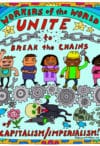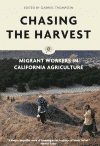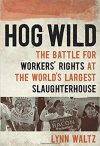Labor

Seattle in 1919 was an island in a still immeasurable sea of timber. The Pacific coastal forests were estimated to contain nearly two-thirds of the timber in the country, and the Washington State forests accounted for the largest part of these. The physical hardships associated with the lumber industry, including isolation deep within the rain forests, made working conditions an even more miserable burden than low wages. The work was seasonal and layoffs were common; the completion of one job might mean termination and the search for work elsewhere. When the winter rains brought an end to work in the woods, the state’s loggers fled to the city, not welcome elsewhere. In some years, there might be thousands on Seattle’s streets. | more…

On a grey winter morning in Seattle, in February 1919, 110 local unions shut down the entire city. Shut it down and took it over, rendering the authorities helpless. For five days, workers from all trades and sectors – streetcar drivers, telephone operators, musicians, miners, loggers, shipyard workers – fed the people, ensured that babies had milk, that the sick were cared for. They did this with without police – and they kept the peace themselves. This had never happened before in the United States and has not happened since. Those five days became known as the General Strike of Seattle. | more…

A Forgotten Chapter in the Working-Class Fight for Democratic Rights
November 5, 2019, is the 225th anniversary of the acquittal of Thomas Hardy on charges of High Treason. Hardy is nearly forgotten today, but for decades workers and democrats in England celebrated November 5 as the anniversary of a major victory, a triumph over a powerful state that had deployed immense resources to crush working-class organizations and suppress popular demands for democratic rights. | more…

Costas Lapavitsas’s The Left Case Against the EU (Polity, 2019) is recognized as the leading work advocating Lexit, the left-wing case for Brexit, and for nations leaving the European Union more generally. In light of current Conservative British Prime Minister Boris Johnson’s commitment to exit the European Union by October 31, even if it means a no-deal Brexit, the role of the left takes on growing importance. Moreover, this raises issues of the European Union generally, including the dominance of neoliberalism within it and the question of German hegemony. Here, Neil Davidson offers an assessment of Lapavitsas’s book. | more…

In this continuation of the exchange on the European Union, the United Kingdom, and the left, Andy Storey engages with Costas Lapavitsas’s arguments in The Left Case Against the EU. | more…

A Socialist Stance Toward the European Union
As part of the exchange on the European Union, the United Kingdom, and the left, Costas Lapavitsas provides an extensive response to Neil Davidson’s and Andy Storey’s contributions. | more…

Winner of the 2018 Paul M. Sweezy – Paul A. Baran Memorial Award for original work regarding the political economy of imperialism, Intan Suwandi’s Value Chains examines the exploitation of labor in the Global South. Focusing on the issue of labor within global value chains—vast networks of people, tools, and activities needed to deliver goods and services to the market and controlled by multinationals—Suwandi offers a deft empirical analysis of unit labor costs that is closely related to Marx’s own theory of exploitation. | more…

The Hidden Abode of Global Production
The analysis of global commodity chains creates some crucial questions in relation to the nature of imperialism in the twenty-first century: (1) whether decentralized global commodity chains can be seen as constituting a decentralization of power among the major actors within these chains, and (2) whether the complexities of these chains suggest that the hierarchical, imperialist characteristics of the world economy have been superseded. I argue that the answer to both of these questions is no. Despite the seemingly decentralized networks, and notwithstanding the existing complexities that characterize global commodity chains, the capital-labor relations inherent in these chains are still imperialistic in their configurations. | more…

In Brazil, there have been two recent parliamentary coups against the Workers’ Party and in favor of banks and corporations. Dilma Rousseff was impeached in 2016 and Luiz Inácio Lula da Silva was prevented from running for president, sequestered, and imprisoned. The electoral coups have resulted in a government without a social base in most of Brazilian society. It does not have a project for the majority or for the nation. It is just a project for international capital, dominated by banks and global corporations. This has led to a government made up of many nuclei of power that, despite internal contradictions, remain in agreement as a unit with regard to the project of capital. | more…

For the last thirty years, the world system has undergone an extreme centralization of power in all its dimensions—local and international, economic and military, social and cultural. Creating a new transnational alliance of workers and oppressed peoples must be the main objective for the genuine militants who are convinced of the odious nature of the world imperialist capitalist system that we have at present. It is a heavy responsibility and the task requires several years before reaping any tangible results. | more…

A Caste System Enforced by State Power
“No one comes out here. No one knows what we go through,” Roberto Valdez, a farmworker in the Coachella Valley town of Thermal, California, tells Gabriel Thompson, the interviewer and editor of Chasing the Harvest, a recently published book of interviews with farmworkers, growers, union activists, teachers, and others. And as one reads through the compelling stories that are told in the collection, one gets a deep sense of what Roberto means, as well as a passionate urge to have others know of the life and work of those who labor in California’s fields. | more…

Capitalism has many victims, but few fare as badly as slaughterhouse workers. Every day, meatpacking workers risk life and limb to provide cheap meat for consumers. Despite this, political scientist Timothy Pachirat once described slaughterhouse work as a form of labor “considered morally and physically repellent by the vast majority of society that is sequestered from view rather than eliminated or transformed.” Yet, slaughterhouses are the sites of some of labor’s greatest triumphs. Lynn Waltz documents one such triumph in her book Hog Wild, which describes how meatpacking workers successfully established a union at the Tar Heel slaughterhouse in North Carolina. While Waltz focuses on the particular fight at the Tar Heel plant, the unionization success of the workers there provides important lessons for future labor struggles. | more…









